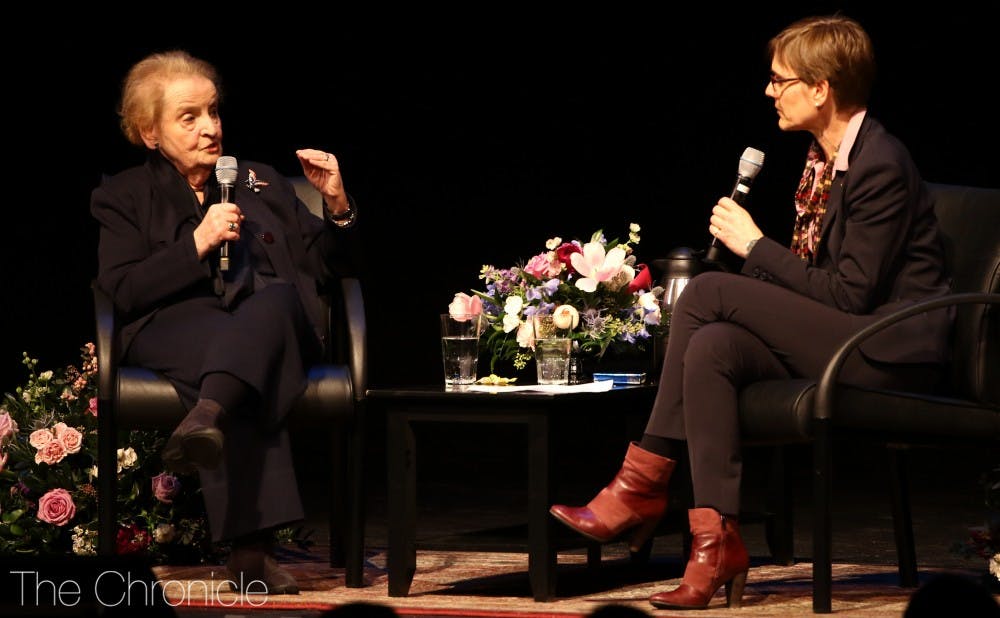Americans should never take democracy for granted and need to think hard about playing a leading role in global democracy, former U.S. Secretary of State Madeleine Albright said during her Thursday talk on campus.
The talk, “The Future of Democracy at Home and Abroad,” was moderated by Judith Kelley—dean of the Sanford School of Public Policy—and was co-sponsored by the Sanford School's David M. Rubenstein Distinguished Lecture Series and Duke's Program in American Grand Strategy.
Immigrating to the United States from Czechoslovakia as a refugee in 1948, Albright said she would forever appreciate American democracy. She recalled her father—one of her greatest role models—telling her Americans did not understand the fragility of democracy and would too often take it for granted.
"I've decided we never can take democracy for granted," Albright said.
However, the United States is not the best model for global democracy, she explained, adding that democracy should be founded upon compromise and coalition building, which the United States is gradually losing.
Democracy around the world is also under threat. Albright noted that the number of viable democracies is on the decline due to loss of identity, technology, information sources and broken social contracts between people and governments.
She added that neither the government nor the people are abiding by their responsibilities of maintaining the democracy.
“What’s happened is that both sides have broken that contract…,” Albright said. "The people in many ways need to [realize that] it is not a privilege to vote, but a responsibility to vote—to figure out what’s going on and how we can all contribute to solutions. And the governments need to recognize the fact that they are dependent on the people.”
She emphasized that building democracy takes time and people. Whereas authoritarian governments may react and respond quicker, democracy’s blessings come with time.
Democracy is ultimately founded upon people and their trust in both a government and in one another, Albright said. As people become disengaged from political participation and from the views and opinions of each other, problems arise.
"We need to talk to people with whom we disagree," she said. "I don’t like the word 'tolerance' or 'tolerate' or 'put up with.' I want to know why people have different viewpoints and have civilized conversations and then restore trust in what people think.”
This idea of a broken social contract ultimately comes down to the fact that times have changed so quickly that governmental systems have failed to update in a different era, she noted.
“We are living in a completely different era…There were systems that were worked out that don’t work now,” Albright said. “What we need to do is sort out what was good in the 20th century…and what will work in the 21st century.”
Albright added that learning to trust humanity and respecting differing viewpoints is essential. Americans need not to demonize other countries and should learn how to operate based on hope instead of hate.
Americans also need to be more aware of where they get information and search for the closest semblance to truth, especially because there are currently numerous media and news outlets available, she said. Albright underlined the importance of reading and listening to different sources.
“It’s not simple and it’s very different than in the era when some of us grew up where there were three major channels, and you trusted what they said at night—it is not like that, you have to do comparison,” Albright said.
She added that America may need to rethink its global position in the 21st century. Indeed, the United States has actively cut its budget and promoted global democracy, but there is no excuse that it should be entirely absent.
“I believe that the United States is the indispensable nation," Albright said. "But there is nothing about the word indispensable that says alone—it just means that we need to be engaged."
Enlarging the impact of democracy requires multilateral effort, Albright said.
"Americans don’t like the word multilateralism—it has too many syllables," she joked. "But all it means is partnership...I think we need to do democracy in partnership with other democracies and not just have it be the American form of democracy.”
Moreover, Albright stressed the importance of heightened international communication in general and for the United States to have diplomatic relations with all countries.
“It doesn’t mean we approve of them, but we need people there," she said. "We need somebody in North Korea to tell us what’s going on, we need somebody in Iran. And we punish ourselves when we don’t have diplomatic representation there to know what’s happening. Diplomats are the eyes and ears and the spokespeople for our value system.”
Finally, when asked about her life as a public servant and advice she would give to college students, Albright said people should pursue a career they are passionate and curious about. And she said public service is a great way to contribute to democracy.
Albright, who had been the first female secretary of state and the highest-ranking woman of her time in the history of the U.S. government, specifically urged women in the audience to “have confidence in yourself and not always say ‘I can’t do that.'"
"You can do anything you put your mind to," she said.
She also called all women to help, support and empower each other and to interrupt actively both in the classroom and amid their everyday discourse.
“There is plenty of room in the world for mediocre men," Albright stressed. "There is no room for mediocre women.”
Get The Chronicle straight to your inbox
Signup for our weekly newsletter. Cancel at any time.

Mona Tong is a Trinity senior and director of diversity, equity and inclusion analytics for The Chronicle's 117th volume. She was previously news editor for Volume 116.

